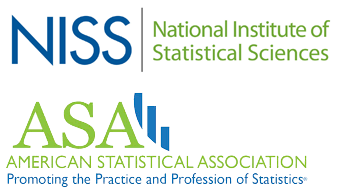

The American Statistical Association (ASA) and the National Institute of Statistical Sciences teamed up to provide an informational webinar that served to shed light on role that modeling is playing in ascertaining how this disease is spreading, predicting how much critical resources will be needed and where, estimating mortality rate, identifying risk factors, and designing trials that will be conducted to evaluate potential treatments and assess the preventive effect of potential vaccines. Over 600 attendees logged in for this inaugural webinar series.
The webinar was opened up by James Rosenberger, Director of NISS and Wendy Martinez, ASA President. The four speakers for this webinar brought with them a wealth of experience and insight: Britta Jewell, (MRC Centre for Global Infectious Disease Analysis at the Imperial College, London) and Nick Jewell, (UC Berkeley and the London School of Hygiene and Tropical Medicine), Dean Follmann, (NIH/NIAID) and Marc Lipsitch, (Harvard University).
Nick Jewell was the first speaker. After providing a quick overview of the COVID19 pandemic and dispelling a few myths he turned the slides over to his daughter Britta Jewell, an accomplished research fellow in infectious disease epidemiology. Among her comments she reviewed the Susceptible-Exposed-Infectious-Recovered or SEIR Mathematical Model and also discussed the importance of the timing of mitigation. Nick continued the review of other models including the Institute for Health Metrics and Evaluation (IHME) model. In summary, they included a helpful list of the current statistical issues that are challenging the medical profession at the same time making it clear that gaps exist in our capacity to prepare for, predict, detect, and respond. Nick and Britta concluded their remarks noting that, “The role of mathematical models and statistical analysis of emerging data have crucial roles to play, but caution is needed in interpretation.”
The second speaker of the session was Dean Follmann, Chief of the Biostatistics Research Branch at the National Institute of Allergy and Infectious Diseases (NIAID). After a brief overview of the role of NIAID he organized his remarks around the functions that his office engages in, i.e, how infectious diseases are fought. He outlined his remarks via the methods his research group engages in. 1) Identification - diagnostic tests to determine if or have you been infected. 2) Description - time from infection to symptoms (incubation), who has been infected (sero-prevalence) and within household transmission. 3) Treatment - adaptive treatment trials. 4) Prevention – vaccines and antibodies. Within each of these areas he included examples of the work that is currently being undertaken.
The final speaker of the session was Marc Lipsitch, Professor of Epidemiology and Director of the Center for Communicable Disease Dynamics at Harvard University. Perhaps the more technical of the four speakers, Marc thanked the other speakers for providing a thorough review of much of the background and proceeded to jump right in to some of the details of the following topics: the challenges associated with estimating seasonality of betacoronaviruses, projecting disease outbreaks with and without interventions such as social distancing, the design of seroprotection studies, i.e., does past infection protect against future infection?, as well as a plug for a simple Bayesian statistical approach for serosurveys.
There was plenty of time for questions and James Rosenberger and Wendy Martinez were kept busy evaluating the range of questions that were submitted by the over 600 attendees in order to bring the more pressing issues to the attention of the panelists.
For those of you that were not able to attend this session you can review a recording of the session below as well as review the slides that were used by the speakers. More importantly, keep your eyes open for the next webinar in this series that will be hosted by both NISS and the ASA that focuses on a different aspect of the COVID19 crisis that we are certain will be of interest to statisticians and data scientists. Statisticians have much to contribute to the fight against COVID-19. Statisticians need to join together and share knowledge we individually possess. This is a fight that all of us have a stake in.
Recording of the Session
Slides Used by the Speakers
Nick Jewell, (UC Berkeley and the London School of Hygiene and Tropical Medicine) & Britta Jewell, (MRC Centre for Global Infectious Disease Analysis at the Imperial College, London)
"The Exponential Power of Now (and Yesterday?)"
Dean Follmann, (NIH/NIAID)
"Statistical Methods and Modeling In Response to COVID-19 at NIAID"
Marc Lipsitch, (Harvard University)
